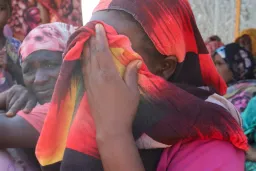For Jacinta Akoth, a 32-year-old mother of two from Kibera, Nairobi’s largest informal settlement, tuberculosis (TB) is not just a disease—it’s a relentless thief. It stole her husband last year, left her battling the infection, and now threatens her children.
"When my husband fell sick, we thought it was just a bad cough," she tells TRT Afrika, her voice trembling. By the time they diagnosed TB, it was too late. Now, I’m on treatment, but the clinic often runs out of medicines. How will I survive if the help dries up?"
Jacinta’s story echoes across Africa, where TB remains the deadliest infectious disease, claiming over 1 million lives globally each year. On World Tuberculosis Day marked on March 24, the World Health Organisation (WHO) issued an urgent call for increased funding to protect TB services—a lifeline for millions.
Funding crisis
Global efforts have saved 79 million lives since 2000, but abrupt funding cuts now risk reversing decades of progress. The hardest hit? Africa, home to nine of the world’s 30 high-burden TB countries.

Kano State in northern Nigeria recorded more than 26,000 cases of TB in 2022.
In South Africa, where drug-resistant TB strains are rising, nurse Thandiwe Ndlovu works in an overwhelmed clinic in Johannesburg.
"Every day, I see patients turned away because we lack tests or drugs," she says. "People come back sicker, infecting others. We’re fighting a war with no bullets."
Early WHO reports reveal 27 countries facing severe TB service breakdowns, with Africa bearing the brunt. Critical health workers are in desperately short supply, crippling care for those who need it most. Diagnostic systems are collapsing in many areas, causing dangerous delays in detecting new cases.
Meanwhile, broken drug supply chains are leaving countless patients untreated, allowing the disease to spread unchecked. These systemic failures are putting lives at risk and reversing years of hard-won progress in the fight against TB.
Ending TB
In Nigeria, where one person dies of TB every 10 minutes, community health worker Sadiq Mohammed sees the fallout daily.
"We used to do active case-finding in rural areas," he tells TRT Afrika. "Now, with no fuel for outreach bikes and fewer test kits, people are slipping through the cracks."
Under the theme "Yes! We Can End TB", the WHO’s 2025 campaign demands urgent action and accountability.
"The gains we’ve made are at risk," warns Dr. Tedros Adhanom Ghebreyesus, WHO Director-General. "But we cannot abandon the commitments made to end TB. We need innovation, investment, and political will."
The numbers, however, paint a stark reality. Only 26 percent of the 22 billion US dollars needed annually for TB care is currently available. Meanwhile, TB research receives just one fifth of its required funding target, severely delaying the development of new vaccines and treatments.
"Every dollar spent on TB brings $43 in economic returns," says Dr. Tereza Kasaeva, WHO’s TB Programme Director. "This isn’t just health, it’s survival."
‘Emergency measures’
Facing this crisis, WHO and the Civil Society Task Force on TB issued a joint statement with urgent demands, calling for immediate emergency measures to restore TB services and warning that delays would cost lives.
The statement emphasized the need for sustainable funding to prevent dangerous treatment gaps that could fuel drug resistance. It also pushed for stronger health systems that fully integrate TB and lung care, arguing that fragmented approaches undermine progress.
In Zambia, activist Lily Nyambe knows the stakes. After losing her sister to TB, she now leads community awareness campaigns.
"Governments must step up," she insists. "We need clinics, not cuts. We need medicines, not excuses."

A combination treatment that enables immuno-compromised people to stave off tuberculosis is now Africa and the world's best bet against a disease that kills millions every year.
Unified fight for survival
WHO’s new guidance pushes for integrating TB care into primary health systems, tackling links with HIV, malnutrition, and air pollution.
Without urgent investment, TB could reclaim its deadly foothold—and millions, like Jacinta, may not get a second chance
For Jacinta in Nairobi, the plea is simple: "Don’t forget us. TB is still here, still killing. But if the world acts now, we can end it."
.















